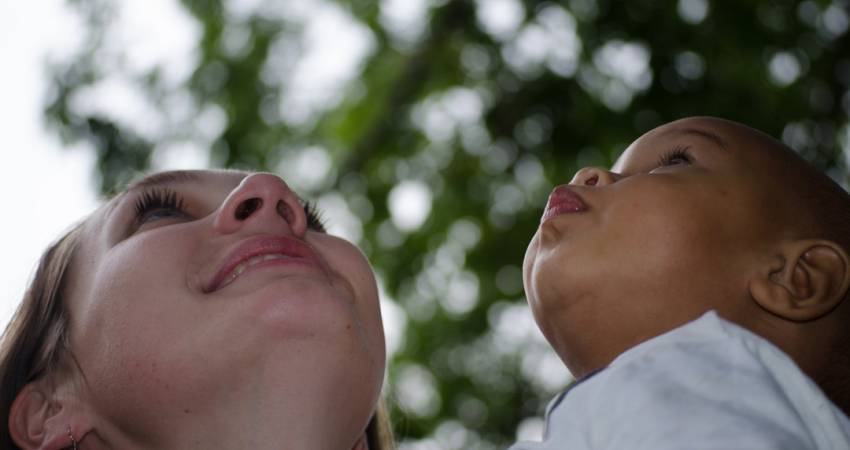
"My baby is a survivor already", says mother-to-be battling cancer while pregnant
Lisa Peterson Bender, from Minneapolis, Minnesota, was 11 weeks' pregnant with her first child when she discovered a lump in her breast. She was then diagnosed with Stage Two breast cancer, which left her and her husband with a major dilemma: treat the young mother, or protect the unborn baby. While women would have been advised to terminate the pregnancy in the past, Mrs Bender's doctors recommended surgery, followed by a course of chemotherapy that would allow her to keep the baby.
This aggressive treatment caused her hair to fall out, but after a final scan after the treatment, the couple found out that their unborn child, a daughter, had survived and was in perfect health.
Mrs Bender said: 'Cancer treatment is very disempowering. It's very invasive. It's very visible. Surgery changed my body. My hair has fallen out...
'This was the last check after chemo to see how her growth was doing. 'We got to see her hair. For me, it just symbolised that she had been protected from the chemo, because I lost most of my hair in treatment.
'The fact that she had hair made me feel like she was OK. That my body had done its job and protected her... I'm just so excited. I just feel like she's such a survivor already.'
Mr Bender, a software engineer, said: 'I had a bad feeling about the lump in her breast the moment I felt it. 'I remember that pause - that moment of pause that was just like... really? No, this can't be...'
His wife, a city planner, heard the news while driving home from work. 'We were devastated,' she said. 'I went through every form of emotion. I was yelling in the car, "No, no, no!"'
The mother-to-be, who is a keen marathon-runner and cyclist and advocates a healthy, organic lifestyle found the cancer treatment a hard concept to accept. 'It's really a matter of my health, my life,' she explained. 'But emotionally it was so hard to think about putting poisonous chemicals in my body.
'I had given up caffeine, I was trying to eat really organic food and then I was going to do chemo? 'The purpose of chemotherapy is to stop cells from growing.' Mr Bender said, 'She wants to protect the baby, in some cases to her own detriment.'
Though the couple have had a gruelling time so far, their battle won't be over when the baby is born later this month. Mr Bender explained: 'Once the baby's here then she'll really be able to hit cancer with everything we can.
'All the drugs and radiation and everything that are in the arsenal that we can't use right now... I want to make sure the baby has a mommy.' Mrs Bender remains philosophical about the future: 'I don't have control over how long I live, but I do have control over how I live now.
'And having children is such an important part of that - for me, for my husband and I.'
Note
Though cancer in pregnancy is rare, it is a growing problem, affecting nearly one in every 1,000 pregnant woman in the U.S. There are new 3,500 new cases diagnosed each year, with between seven and 15 per cent of pre-menopausal breast cancer sufferers expecting a child. The rising numbers are blamed on the fact that more women are delaying motherhood until their thirties and forties.
A Swedish study published in the journal Obstetrics and Gynecology revealed that the incidence of cancer in pregnancy had more than doubled between 1963 and 2002.
Research has found that certain chemotherapy drugs, such as Cytoxan and Ardriamycin, which were used in Mrs Bender's treatment, are safer during pregnancy because the drug molecules are too large to pass through the placenta, thus less likely to affect the unborn child.
LINKS
Featured
- Abortion coercion has arrived in Ireland – the NWC are silent
- Review of at-home abortions 'needed after coercion case'
- French Govt to remind 29-year-olds of biological clock
- Huge factor in decline in primary school numbers ignored
- Germany Denies Promoting Abortion Abroad—While Funding Pro-Abortion NGOs
- Govt don’t oppose Coppinger abortion bill at 1st stage
- March for Life: Vance, the White House, and a Divided Pro-Life Movement
- Paris’ Annual March for Life Puts Euthanasia in the Spotlight
- Britain’s seemingly limitless abortion rate
- The importance of the work carried out by Every Life Counts
- Puerto Rico officially recognizes unborn children as ‘natural persons’
- Assisted suicide laws stalled by “complex” legal issues
- Yes, that hideous celebration of 300 abortions is real
- White Crosses Memorial: Dungarvan once again pays its respects to our aborted babies
- Josiah: Abortion Survivor
- Rally for Life 2025
You can make a difference.
DONATE TODAY